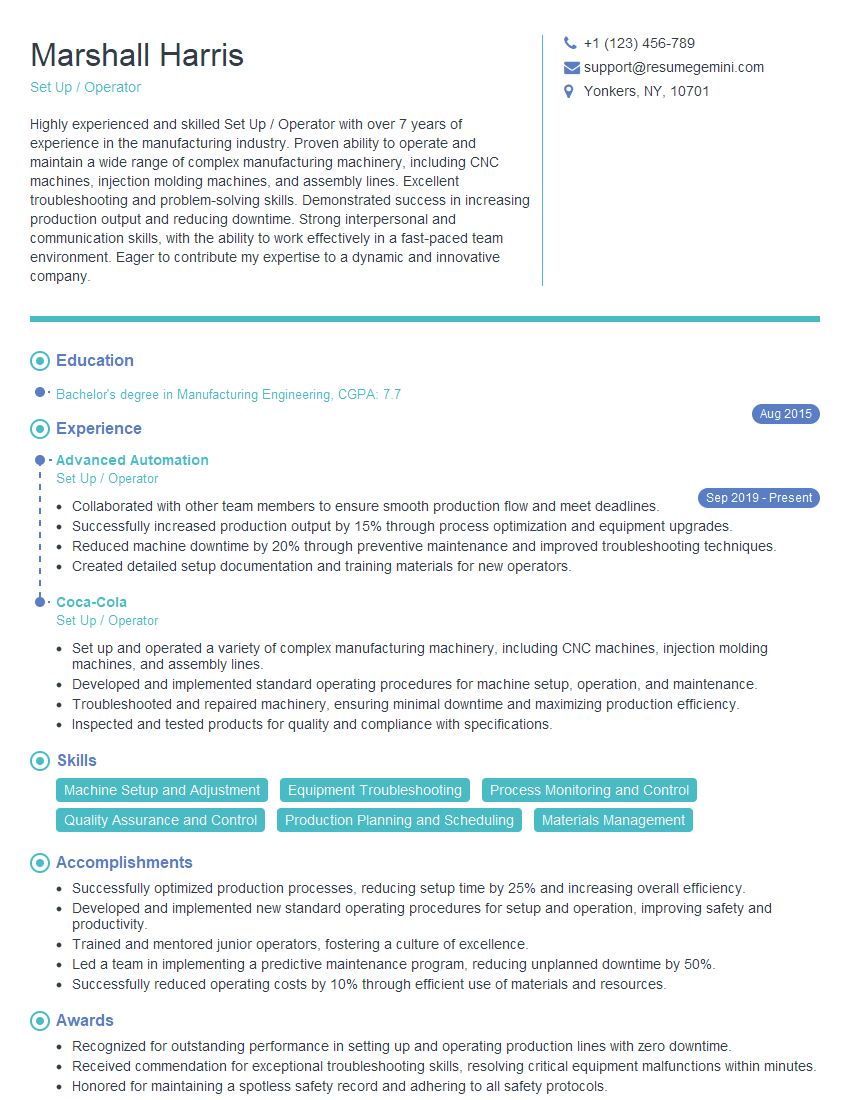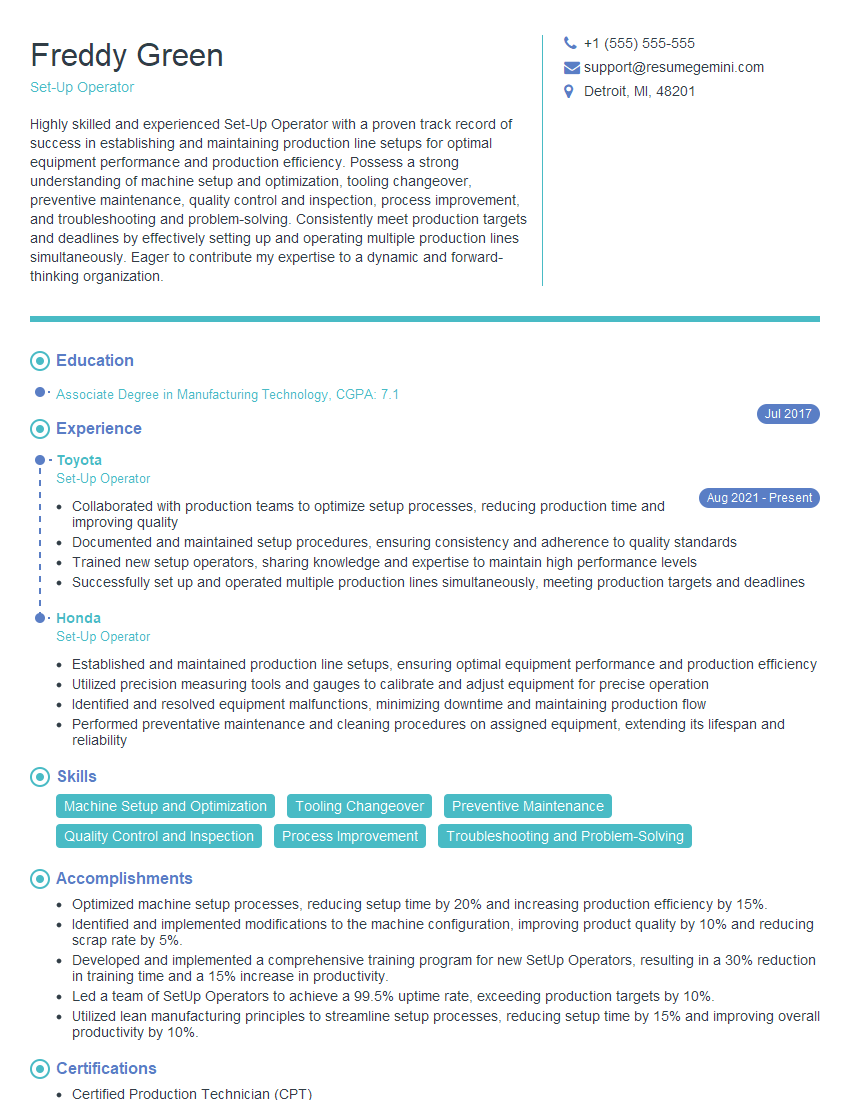Are you gearing up for an interview for a Set Up / Operator position? Whether you’re a seasoned professional or just stepping into the role, understanding what’s expected can make all the difference. In this blog, we dive deep into the essential interview questions for Set Up / Operator and break down the key responsibilities of the role. By exploring these insights, you’ll gain a clearer picture of what employers are looking for and how you can stand out. Read on to equip yourself with the knowledge and confidence needed to ace your next interview and land your dream job!
Acing the interview is crucial, but landing one requires a compelling resume that gets you noticed. Crafting a professional document that highlights your skills and experience is the first step toward interview success. ResumeGemini can help you build a standout resume that gets you called in for that dream job.
Essential Interview Questions For Set Up / Operator
1. What are your primary responsibilities as a Set Up / Operator?
As a Set Up / Operator, I consistently deliver high-quality products by ensuring that all equipment is running smoothly and efficiently. Here are my primary responsibilities:
- Setting up, calibrating, and maintaining production equipment.
- Executing production orders, ensuring product specifications are met or exceeded.
- Conducting routine quality checks throughout the production process.
- Performing preventive maintenance and troubleshooting to minimize downtime.
- Adhering to safety protocols and good manufacturing practices.
- Collaborating with team members and supervisors to optimize production processes.
- Documenting production data and maintaining accurate records.
2. Can you describe your experience in optimizing production processes?
Specific Example 1
In my previous role, I analyzed production data to identify areas for improvement. I implemented a new equipment setup procedure that reduced setup time by 20%, resulting in a significant increase in productivity.
Specific Example 2
I also optimized the product quality inspection process by introducing automated inspection equipment. This resulted in a 15% reduction in defective products and improved customer satisfaction.
3. How do you ensure that you are meeting the high quality standards required in this role?
Maintaining the highest quality standards is paramount in my approach. Here’s how I ensure compliance:
- Rigorously adhering to established quality control procedures.
- Performing regular equipment calibrations and preventive maintenance.
- Conducting thorough inspections at each stage of the production process.
- Documenting all quality checks and maintaining detailed records.
- Continuously seeking opportunities for improvement and implementing quality enhancements.
4. What are some common production challenges you have faced, and how did you overcome them?
- Equipment malfunction: I quickly diagnose the issue, perform necessary repairs or adjustments, and bring the equipment back online with minimal disruption.
- Product defects: I analyze the root cause of the defect, adjust production parameters, and implement corrective actions to prevent recurrence.
- Production delays: I prioritize tasks, allocate resources efficiently, and communicate effectively to ensure timely delivery of products.
- Safety concerns: I promptly identify potential hazards, implement safety measures, and train colleagues to maintain a safe working environment.
5. How do you stay up-to-date on the latest advancements in manufacturing technology?
I am committed to continuous learning and professional development. Here are some methods I use to stay informed about industry advancements:
- Attending industry conferences, workshops, and training programs.
- Reading technical journals, industry publications, and research articles.
- Networking with professionals in the field and exchanging knowledge.
- Exploring online resources, webinars, and e-learning platforms.
- Seeking opportunities to implement new technologies and best practices in my current role.
6. What are the key performance indicators (KPIs) that you track to measure your success in this role?
- Production output and efficiency.
- Product quality and defect rates.
- Equipment uptime and maintenance costs.
- Safety compliance and incident rates.
- Customer satisfaction and feedback.
7. How do you prioritize tasks and manage your time effectively in a fast-paced production environment?
Time management and prioritization are crucial in my role. I employ the following strategies:
- Creating and following a daily or weekly production schedule.
- Identifying critical tasks and allocating resources accordingly.
- Delegating tasks to team members when appropriate.
- Using technology tools for task management and communication.
- Regularly reviewing progress and adjusting priorities as needed.
8. What are your strengths and weaknesses as a Set Up / Operator?
Strengths
- Strong technical skills and a deep understanding of manufacturing processes.
- Excellent problem-solving and analytical abilities.
- Attention to detail and commitment to quality.
- Proactive approach to preventive maintenance and equipment optimization.
- Ability to work independently and as part of a team.
Weaknesses
- I can sometimes be too focused on details, which may lead to spending more time than necessary on certain tasks.
- I am always eager to learn and improve, but I recognize that I may not have as much experience with the latest technologies as some other candidates.
9. What motivates you to excel in this role?
I am driven by the satisfaction of delivering high-quality products and contributing to the success of my team and organization. Additionally, I am passionate about continuous improvement and finding innovative ways to optimize production processes. The challenge of ensuring that everything runs smoothly and efficiently is what motivates me to excel in this role.
10. Why do you think you are the best candidate for this position?
With my technical proficiency, strong work ethic, and commitment to quality, I am confident that I possess the necessary skills and experience to excel as a Set Up / Operator in your organization. I am eager to contribute my knowledge and expertise to your team and support the achievement of your production goals.
Interviewers often ask about specific skills and experiences. With ResumeGemini‘s customizable templates, you can tailor your resume to showcase the skills most relevant to the position, making a powerful first impression. Also check out Resume Template specially tailored for Set Up / Operator.
Career Expert Tips:
- Ace those interviews! Prepare effectively by reviewing the Top 50 Most Common Interview Questions on ResumeGemini.
- Navigate your job search with confidence! Explore a wide range of Career Tips on ResumeGemini. Learn about common challenges and recommendations to overcome them.
- Craft the perfect resume! Master the Art of Resume Writing with ResumeGemini’s guide. Showcase your unique qualifications and achievements effectively.
- Great Savings With New Year Deals and Discounts! In 2025, boost your job search and build your dream resume with ResumeGemini’s ATS optimized templates.
Researching the company and tailoring your answers is essential. Once you have a clear understanding of the Set Up / Operator‘s requirements, you can use ResumeGemini to adjust your resume to perfectly match the job description.
Key Job Responsibilities
Set Up / Operators are responsible for a variety of tasks that ensure the smooth and efficient operation of their respective work areas. Their key responsibilities typically include:
1. Machine Setup and Operation
Setting up, operating, and monitoring production equipment to ensure consistent and high-quality output.
- Following established procedures and specifications for machine setup and operation.
- Identifying and resolving any equipment malfunctions or issues promptly.
2. Material Handling
Loading, unloading, and transporting materials within the work area.
- Ensuring proper handling and storage of materials to prevent damage or loss.
- Maintaining a clean and organized work area to minimize safety hazards.
3. Quality Control
Inspecting products and materials to ensure they meet quality standards.
- Identifying and segregating defective items or materials.
- Reporting any quality issues to supervisors or other relevant personnel.
4. Maintenance and Housekeeping
Performing routine maintenance tasks on equipment and work areas.
- Cleaning and lubricating equipment to prevent breakdowns.
- Maintaining a safe and organized work environment.
Interview Tips
To ace the interview for a Set Up / Operator position, it is important to highlight your skills and experience in the following areas:
1. Technical Skills
Demonstrate your proficiency in operating and maintaining production equipment. Describe your experience with specific types of machinery and any relevant technical certifications you hold.
- Quantify your accomplishments in terms of productivity gains, quality improvements, or cost savings.
- Provide examples of how you troubleshoot and resolve equipment issues efficiently.
2. Attention to Detail
Emphasize your keen eye for detail and your ability to identify and resolve quality issues. Share examples of how you have ensured that products meet specifications and customer requirements.
- Discuss your understanding of quality control procedures and your experience in implementing them.
- Describe how you maintain a clean and organized work area to minimize errors and accidents.
3. Teamwork and Communication
Highlight your ability to work effectively as part of a team and to communicate clearly with supervisors and other team members. Describe your experience in collaborating on projects and sharing knowledge.
- Provide examples of how you have contributed to team success and improved overall productivity.
- Describe how you communicate effectively with both technical and non-technical personnel.
4. Safety and Compliance
Demonstrate your commitment to safety and compliance with industry regulations. Discuss your experience in following safety protocols and your understanding of the importance of maintaining a safe work environment.
- Provide examples of how you have identified and addressed safety hazards in the workplace.
- Explain your understanding of relevant safety regulations and how you ensure compliance.
Next Step:
Armed with this knowledge, you’re now well-equipped to tackle the Set Up / Operator interview with confidence. Remember, preparation is key. So, start crafting your resume, highlighting your relevant skills and experiences. Don’t be afraid to tailor your application to each specific job posting. With the right approach and a bit of practice, you’ll be well on your way to landing your dream job. Build your resume now from scratch or optimize your existing resume with ResumeGemini. Wish you luck in your career journey!

